Demagogy: Aristotle and Ortega y Gasset
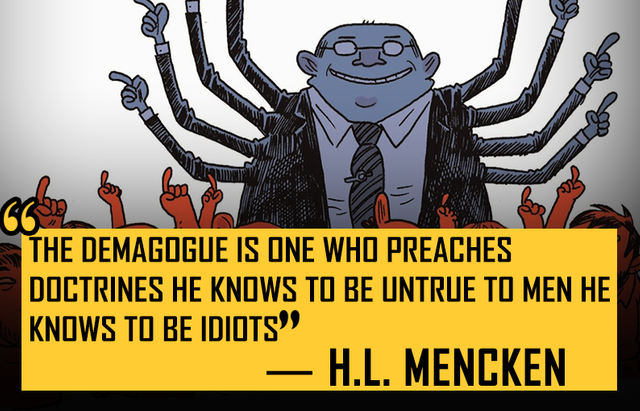
It is no surprise to anyone that governments with democratic systems or representative republics - the world system by definition - always result in demagoguery, as Aristotle wondered why democracy always results in demagoguery? In the other system, - less predominant - I am referring to the autocratic or rather totalitarian system, the autocrat always has absolute power at his mercy. The latter is becoming more and more common in the world we live in today and its coming to power is through democracy, through discursive techniques, pure demagogy. This is the example of Hugo Chávez, Daniel Ortega, among others.
According to Aristotle, demagogy was the corrupt or degenerate form of Democracy that led the institution to a tyrannical government of the lower classes of many who ruled in the name of the people. Aristotle proposed three different systems to which he assigned three corresponding degenerations
- Monarchy - Tirany
- Aristocracy - oligarchy
- Democracy - demagoguery
For this great philosopher, demagogy consisted of an approach of popular governments, that is, it is governed by the appeal of an alleged authority emanating from a majority, in which the law is meaningless since it is subordinated to the yoke of many, the majority - a fallacy of argument ad populum, in itself that is democracy, a fallacy. And it is at this moment that demagogues emerge who flatter the citizens, claim their feelings, "No one is wiser than the people" (exploited today, by any pseudo-democrat). Aristotle, therefore, defined the demagogue as the "flatterer of the people". For Aristotle and Plato, demagogy produces the establishment of an authoritarian and tyrannical regime, which eliminates all opposition - do you still believe that our governments are democratic? - on these occasions, demagogues give themselves the right to interpret the interests of the masses and thus proceed to appropriate power, to carry out the interests of the "people" through a dictatorship.
He stated it clearly in his book, Politics:
This type of Aristotelian thought was considered by Ortega y Gasset an example of philosophical demagogy because Aristotle considers himself the absolute defender of the common sense to which demagogues appeal, betting on simplicity and avoiding the complexity and difficulty of recognizing and interpreting facts.
For Ortega, Aristotle demagogues the rationality that goes hand in hand with the senses and maintains that this demagogic, popular character of the Aristotelian-Scholastic way of thinking has not been further deepened. His doctrine starts from the admission that "it is only true for the majority: the ontological 'evidence' of the senses. This is Sancho Panza's criteria. Faith in the senses is a traditional dogma, a public institution established in the irresponsible and anonymous opinion of the'people', of the community.
It follows, then, that from that error comes what Ortega defines as the "common place" which, as a social or collective mode, is not conscious; it is blind, it is mechanical. In these common places, demagogues who appeal to supposed common sense without rational foundation drink. In fact, Aristotle's most outstanding scientific errors were caused by his dependence on the usual interpretation of appearances provided by common sense. For example, their belief that the "natural place" of stones is the soil because they are always on it, according to common sense.
Ortega, when referring to the demagogic statements, uses as an example the famous Gracchus brothers of the history of Rome. For Ortega y Gasset, the Gracchi were demagogues. They had confused thoughts about revolutions, they didn't know what or what they didn't want. They were dedicated to avoiding all problems without solving any. "Vague minds, pathetic souls, theatrically attracted by heroic gestures they have seen before in books," who get drunk talking, promising everything and dividing everyone with disastrous consequences.
The fact that most countries today are immersed in the yoke of demagogy following the degeneration of democracy in their constitutions and institutions should not be alien to the majority, yet there is a persistent tendency for the so-called direct democracy by the majority of society, which leads them to vote irrationally in illogical referendums, illegitimate votes, to support persecutions of political opponents and to sponsor the illegal use of force against minorities not involved with the current government which aim is the eschatology of the "common good for everyone", all these evils are typical of demagoguery used to hoist a system of direct democracy and not of democracy or representative republic.
For Ortega, it was precisely the absence of the idea of political representation of democracy that led Rome to disaster.
In other words, demagogy, usually conducive to an easily manipulated direct democracy, progressively leads to the degeneration of political institutions and a return to the tribal origins of politics, i.e. a return to primitive political systems.
For Ortega, modern demagogy was born in the prologue of the French Revolution, around 1750. Although he points with an anecdote to Victor Hugo as an example of the infamous demagogy that makes people speak in and on behalf of humanity, he believes that this practice "is the most sublime, and therefore the most despicable form of demagogy, was adopted around 1750 by intellectuals who were misguided, ignorant of their own limits and who, because of their work, were the men of saying, of logos, used it without respect or precautions, without realizing that the word is a sacrament of very delicate administration".
Consequently, for Ortega, demagogy is a degeneration as we have already stated, above all, intellectual, because it can have as a consequence the condemnation of a civilization and its collapse; one need look no further than the Latin American continent itself to observe how the demagogic use of intellectuals has destroyed a continent and plunged it into the poverty of cultural and ethical values. "It is indeed very difficult to save a civilization when the time has come for it to fall under the power of demagogues. Demagogues have been the great stranglers of civilizations. The Greek and the Roman have succumbed to this repugnant animals" that has produced the most vile examples of human nature, just to exemplify it is enough to see the governments of great political strategists like Mao Tse Tung, Hitler, Mussolini, Castro and Hugo Chavez, all manipulators of the word and - according to them - knowledgeable of the universal logos.
Ortega adds:
The demagoguery, the propaganda on the masses. That's what he calls his first pilots:
Who are these men, he wonders. Ortega reviews the demagogues, different in form but identical in substance. In history they have been "Sophists, cynical or semi-stoics philosophers; they are priests of Eastern religions, and soon, half a century later, such a vast fauna of the lower social depths will be nourished by a new caste: the Christian proselytes (the cattle or convinced by and for the Christian religion that preached against the established order). All of them agree on the radicalism of their speeches: they go against the wealth of the rich, the pride of the powerful; they go against the wise, against the constituted culture, against the complications of all kinds. According to them, the one who is more right, the one who is worth more, is precisely the one who knows nothing, the one who has nothing, the simple, the poor, the humble, the profane".
Demagogues are those who plunge people into ignorance through rhetoric and that they end up harming intelligence, culture, logic, and truth. Therefore, demagogy seeks to eliminate the effort to learn, to improve, to be better, whereas democracy demands such an effort. It may seem unusual, but it even refers to the need for citizens to know the science of their time, even though they know that they are faced with the demagogic habit of minimal effort.
He, therefore, recommended that everyone must be alert to the changes that were taking place at the beginning of the 20th century.
Demagogy tries to turn citizens into fools by cultivating their ignorance and their lowest tendencies, simplism, hatred, and sectarianism, among others. Ignorance produces stupor, a kind of motionless agitation before demagogues who seem to know everything and know everything. When stupor lengthens in time, it becomes stupidity, which is the opposite of standing before things and thinking about them. The demagogues present themselves as men of action against those who recommend an in-depth analysis of the problems.
When a pure action is divinized, "space is populated with crimes. Men's lives lose value, their lives lose price, and all forms of violence and dispossession are practiced. Above all, of the dispossession". Demagogues are people without accuracy, unscrupulous and run over," he says.
True democracy does not need propaganda "which is always falsehood, foul play, and rhetoric". And he develops his idea against demagoguery by proposing that nothing be based on phrases, farces, "vile provocation of demagogic contagions -not intolerance-, few laws, because the law once written becomes the rule of pure words, which, since they cannot literally be fulfilled, obliges government indecency that falsifies its own law".
We must not delude ourselves about democracy simply because in it, tyranny coexists in a state of repose, which is always encouraged by demagogues. Democracy needs limitations to preserve freedoms. For example, Aristotle himself considered radical democracy to be a tyranny and, even in the earliest times, Tocqueville detected this disease of democracy consisting in leading to the despotism of the majority or majority absolutism, the enemy of freedom. Therefore, for Ortega, the idea of democracy should not be left to the "infants of thought" who are politicians.
He gives as an example what happened when democracy spread at the beginning of the 19th century. With it, "the peoples of the West began to fall into the power of the demagogues - be they of the left or of the right - and as the only tactic of these irresponsible characters is to make every effort to alcoholise the masses, the conscience of Nationality, which had already been in existence for two centuries of peaceful, peaceful life, became a political programme". It was the origin of the nationalisms that, driven by hyperdemagogues, led to the wars in Europe and, more recently, to the populists of Latin America.
The only hope is to consider that demagogues have a bad end. Ortega says in reference to Friar Savonarola, that they begin as "saints", become "demagogues" themselves and end up being "tragic histrions". It is not much in view of the suffering that this democratic degeneration produces.
| References | |
|---|---|
| La última filosofía - Ortega y Gasset | |
| Política - Aristoteles |
 |  |
|---|---|
 |  |


© 2001 - 2017 All rights reserved. steemit.com/@blackliberal | Terms & Conditions of Use | Privacy Policy
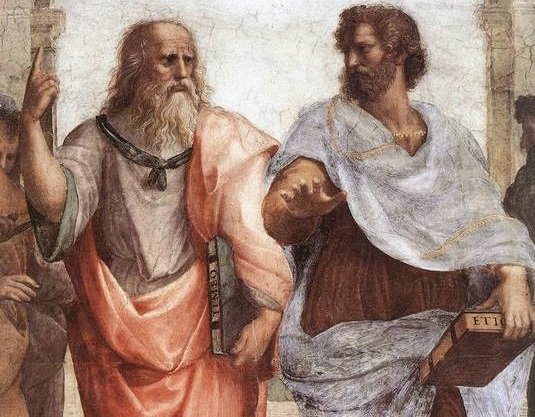



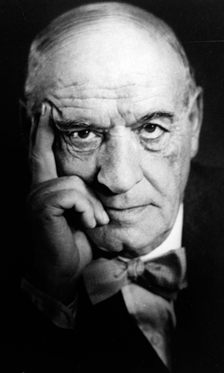
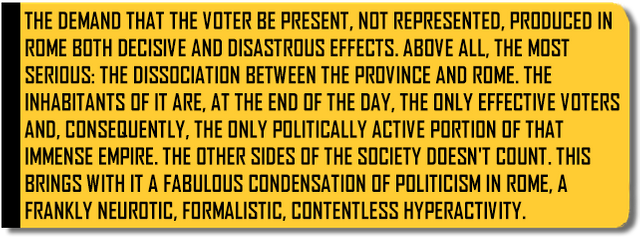







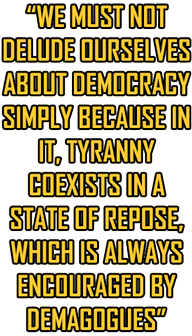


For instance, Only complete idiots believe socialism actually works.